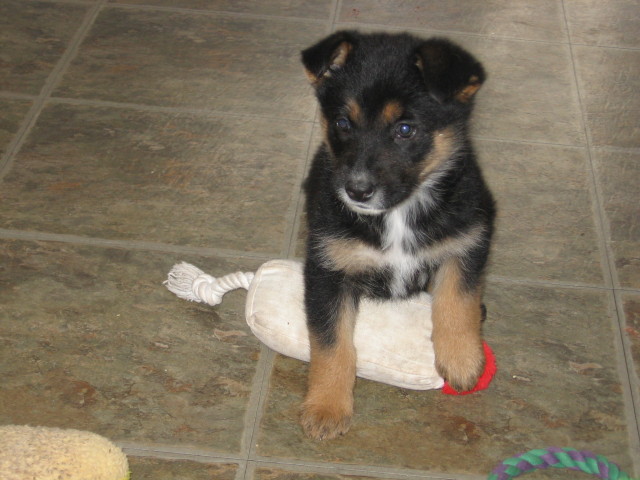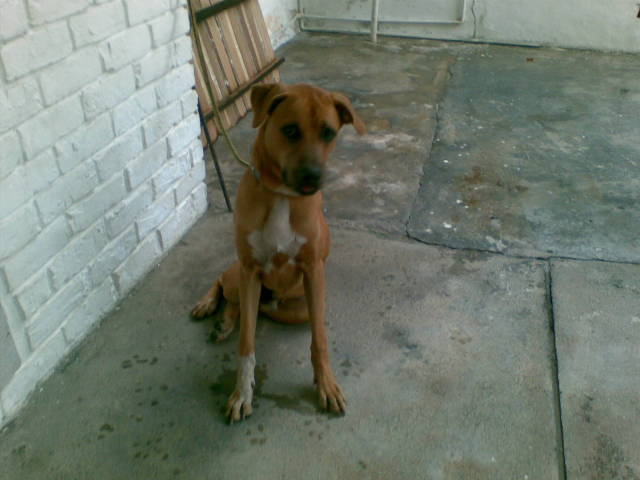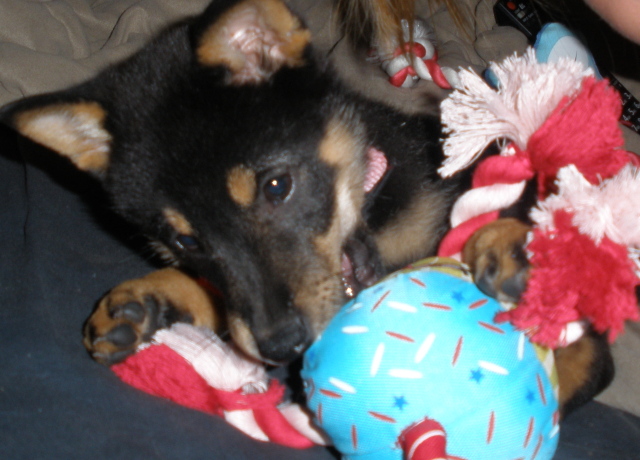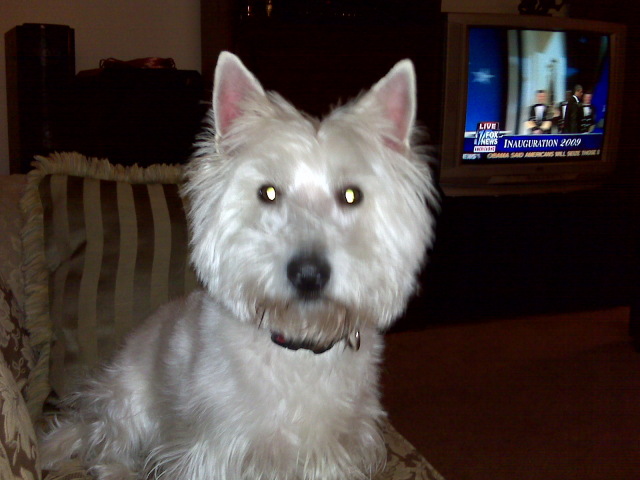QuestionHi,
We recently took on a 4 year old German Shepherd, (pure bred spayed female) , as a rescue project from the city pound. They had tried to adopt her out without success and it was hoped she would not have to be put down. We have owned German Shepherds in the past, having them live long healthy lives as loved family pets. She has been a difficult project, but we are having success and she is really improving.
She was microchipped and ear tattooed, so we have some idea of her history which has not been good. Repeated returns to various animal shelters and abandonment. She shows emotional signs of having been mistreated. (afraid of the raised hand with cowering expectations of being hit) She was last picked up as a stray, malnourished and dehydrated with a piece of chewed rope around her neck in the downtown busy streets. The best guess is that she was tied up to a tree in a wild section of the park where homeless people live which is near the downtown area where she was found, and may have escaped.
She was in the city pound for a month. Her behavior was to sit with her head in the corner, and would not make eye contact with people. She was not aggressive, in fact she was very sweet and would lick your hand once or twice and withdraw back into her corner. She was not adoptable due to obvious behavior problems.
We took her home to work with her. For the first 3 days she would only pace and whine constantly. She would not relate to or make eye contact with people. She would let you pet her once or twice and then pull away and run away looking for away to escape. She would try to jump through glass windows, even on upper floors two stories up. Pacing and whining was constant. She also would have long periods of just looking up, at the sky or ceiling like she is transfixed on looking for something.
She would calm down on a leash, seems to be house trained and walks well on a leash. She obviously has been taught to walk on a leash and to heel. She is calm when being walked on leash, so she gets lots of walks. She would only go to sleep if she was on a leash and held. I slept the first 4 nights with her on leash beside my bed and the leash looped around my foot. When she would start to whine, I would give a short gentle tug, and she would lay back down and go back to sleep.
One month later she is doing really well. She is still a bit skittish, but is fitting into the family and seems much happier. She sleeps beside our bed off leash. She sleeps through the night. She goes to everyone's bed in the morning and licks them in the face until they wake up. She will maintain eye contact and comes when called. She will come up to us and use her nose to "nuzzle" for head petting. I can walk her off leash and she loves chasing and returning the ball. Lots of exercise in fenced areas where she can run and play. She is a keen tracker. She loves training and is very smart as German Shepherds are. She sits, stays, comes and goes down on command. She takes treats very gently from the hand. She is very good with other dogs, but plays a bit rough and is protective of her ball.
The problem is that she still has short periods, "out of the blue" once every two or three days, when she returns to her previous behavior. Not as bad, but she will start to whine and pace, then be transfixed, motionless with her head staring in the corner or up at the sky or ceiling. Treats or trying to get her to walk or even get her attention in these times is impossible. It is very strange and I have not been able to see any thing that would trigger the behavior. the behavior will last one to two hours and then,as suddenly, she is fine. The rest of the time she is fantastic and people who just see her for a short time comment on what a wonderful happy dog she seems to be, very affectionate and smart. I am not sure if she still has emotional problems that will get better over time or if she is having some kind of seizures or other physiological symptoms. We have had been to several vets and her health seems to be fine based on all of the regular tests. I think she will respond well to some type of structured training and would enjoy it. We are looking at a Shutzhund training program. I am contacting you because you seem to be serious about dog behavior and may have seen this type of anxiety before. Is it separation anxiety, maybe from another dog she was with, or from people? However she seems not to have been in a stable situation since she was first dropped off at an animal shelter when she was one year old. The owners at that time listed the reason for abandonment as they did not want to pay the vet bills for ear infections. She was then adopted out by the animal shelter to an old couple and returned to the shelter after a few months. One of them died. Then she was adopted out again, but we cannot trace those owners. But it was in a town several hundred miles away. So who knows what her experience has been over the past two years. No record.
It may have been original separation anxiety from the first owners that was never dealt with, and then just neglect for the past two years. So I am not sure if it is separation anxiety or neglect or a combination of these factors. Any help or advice from your experience would be appreciated. I have also asked another expert who has experience with German Shepherds.
AnswerBefore addressing the issue at hand, let me strongly advise you to NOT involve this dog in any shutzhund training. This is strongly contraindicated by her past, prolonged emotional state, her behavioral ambivalence (which you have managed to ameliorate) and your total inability to gauge what sort of "training" she has received that might cause negative transference. Use ONLY positive reinforcement training with this dog and do not engage any work with her bite inhibition. The last thing to do with an overtly fearful dog (whether fear is genetic or acquired) is BITE WORK. No way!!! Use the clicker or any other reinforcement cue for reward. The GSD is a sublime candidate for this sort of work. Also, since your dog shows a proclivity for search and rescue, I strongly suggest you take her training in that direction. She is street savvy, having learned to negotiate traffic, crowds, many strangers and many stimuli and would make an excellent S&R dog. Look for S&R clubs in your area and get busy teaching her skills which will not only enormously affect her cognitive abilities and problem solving skills (thereby enhancing her life experience) but can also offer a strong support for the community. S&R is a highly rewarding activity for both dog and handler.
Regarding her first attempt to even jump out of windows, this is not uncommon in dogs that have been at large and are suddenly confined and terrified (even though that confinement was with you, a loving person.) Using the leash to contain her distress was a brilliant idea on your part; this is a method I advise people to use on fearful dogs, dogs demonstrating cognitive dysfunction (circling), etc. Regarding her staring off into space (as you have described), I would like you to conduct an experiment. When she next demonstrates this behavior, put the leash on her. If she responds immediately or within one minute and returns to normal behavior, you know this behavior is a psychological response triggered by something unknown (a sight, slant of light, sound from outdoors, scent); much like music can transport a human to a place distant in time, visual and aural stimuli can trigger a strong conditioned response in a dog. Often the original cause will never be known and even the trigger may never be identified. If this IS a conditioned reaction to some unknown trigger, and if the dog readily recovers from this "trance" when on leash, then you must continue to interrupt such trances with the leash and engage the dog in some play training immediately after the dog has returned to normal cognition. This will form a strong connection between fun and learning that will eventually bridge the trance and it will extinguish. IF, however, the dog does NOT respond to the leash while in this trance state, you may be looking at temporal lobe seizures. Observe CLOSELY in which direction the dog's eyes are pointed and make note if the direction is consistent EVERY TIME, as this is an indication that the brain lesion (if any) is on the OPPOSITE side of the brain from the direction the dog's eyes take. Temporal lobe epilepsy can be caused by injury, infection, brain tumors, genetic syndromes and lesions of any sort. CT scan, cranial MRI and lumbar puncture are tests used to attempt to diagnose cause. For this you need a VETERINARY NEUROLOGIST, and you can normally find one at the veterinary college in your geographical area. Such a college might even be able to give you a referral.
You've done a wonderful thing for this dog, you are very special people. I have a feeling she can do a great service to your community in S&R work and I know she will prove to be one of the best dog companions you have ever had. I hope this focal problem resolves without the necessity for expensive testing. Epilepsy is a common problem in dogs; many demonstrate it casually over large time periods; many have just one or two seizures; some require medication. Most of the time, it can be successfully controlled. Please repost with future reports.

 puppy problems
QuestionQUESTION: I am the proud owner of 2 german shep
puppy problems
QuestionQUESTION: I am the proud owner of 2 german shep
 Agressive 1 yr old mini goldendoodle
Question
our millie
My husband and I got our min
Agressive 1 yr old mini goldendoodle
Question
our millie
My husband and I got our min
 dogs behaviour
QuestionMy 8 months old Dusto
QUESTION: My puppy
dogs behaviour
QuestionMy 8 months old Dusto
QUESTION: My puppy
 My Shiba Inu
Question
Lola
I bought a registered Shiba Inu puppy fro
My Shiba Inu
Question
Lola
I bought a registered Shiba Inu puppy fro
 Companion for Lonley Westie
Question
Shannon
We have a 5-year-old neutered Westie w
Companion for Lonley Westie
Question
Shannon
We have a 5-year-old neutered Westie w